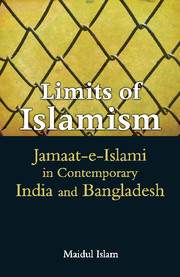Book contents
- Frontmatter
- Dedication
- Contents
- List of Tables
- Acknowledgements
- Introduction: Islamism(s) of Academics and Islamists
- Chapter 1 Islamism and Ideology: Philosophical Issues and Analytical Categories
- Chapter 2 Islamism in Neoliberal India
- Chapter 3 Ideological Articulations of Jamaat-e-Islami Hind
- Chapter 4 Islamism in a Muslim Majority Context: The Case of Bangladesh
- Chapter 5 The Crisis of Islamist Populism of Bangladesh Jamaat-e-Islami
- Chapter 6 Islamism in Contemporary India and Bangladesh: Comparative Overview of the Politics of Alternative
- Appendix
- Bibliography
- Index
- About the Author
Chapter 1 - Islamism and Ideology: Philosophical Issues and Analytical Categories
Published online by Cambridge University Press: 05 April 2015
- Frontmatter
- Dedication
- Contents
- List of Tables
- Acknowledgements
- Introduction: Islamism(s) of Academics and Islamists
- Chapter 1 Islamism and Ideology: Philosophical Issues and Analytical Categories
- Chapter 2 Islamism in Neoliberal India
- Chapter 3 Ideological Articulations of Jamaat-e-Islami Hind
- Chapter 4 Islamism in a Muslim Majority Context: The Case of Bangladesh
- Chapter 5 The Crisis of Islamist Populism of Bangladesh Jamaat-e-Islami
- Chapter 6 Islamism in Contemporary India and Bangladesh: Comparative Overview of the Politics of Alternative
- Appendix
- Bibliography
- Index
- About the Author
Summary
Islamism poses a number of contradictions in the context of contemporary globalization. Its critique of the ‘Imperialist Western powers’ by challenging the Eurocentric discourses while being historically nurtured by the Western power bloc is a classic contradiction in itself. The contradictions of its totalistic ideology are exposed in defying the project of Western enlightenment and modernity by describing it as a ‘rule of ignorance’ (Nizam-e-Jahiliya) while taking refuge in a particular form of Islamist totalism, whose construction would not have been possible without its recourse to the (re)interpretations of Western knowledge systems in an Islamic context.
I write this book in the context of current debates on the study of ideologies that question the previous assumption that ideologies by nature are ‘secular’ and, thus, ‘disentangled from religious faiths’. Scholars have pointed out serious limitations of conventional studies on ideology that make ‘sharp demarcations between ideologies (which are defined as political, action-orientated and intimately tied to modernity) and religions (which are dismissed as otherworldly, conservative and anti-modern)’. In this respect, recent literature on ideology suggests that Islamism as a comprehensive worldview can be regarded as a modern political ideology, since it meets the accepted definition of a modern ideology with a universal morphology and a structured pattern of core, adjacent and peripheral concepts.
However, it is not enough to merely acknowledge Islamism as a modern ideology with a morphological character of its own. Rather, considering Islamism in India and Bangladesh, I tend to reject the general tendency of the literature on Islamism in privileging the ‘Greater Middle-Eastern’ specificity that does not represent the globality, heterogeneity and plurality of the Muslim world. Moreover, India and Bangladesh are home to the third and fourth largest concentration of Muslims in the world after Indonesia and Pakistan and the Indo-Bangladeshi Muslims together constitute around 20 per cent of the world's total Muslim population.
- Type
- Chapter
- Information
- Limits of IslamismJamaat-e-Islami in Contemporary India and Bangladesh, pp. 60 - 94Publisher: Cambridge University PressPrint publication year: 2015



